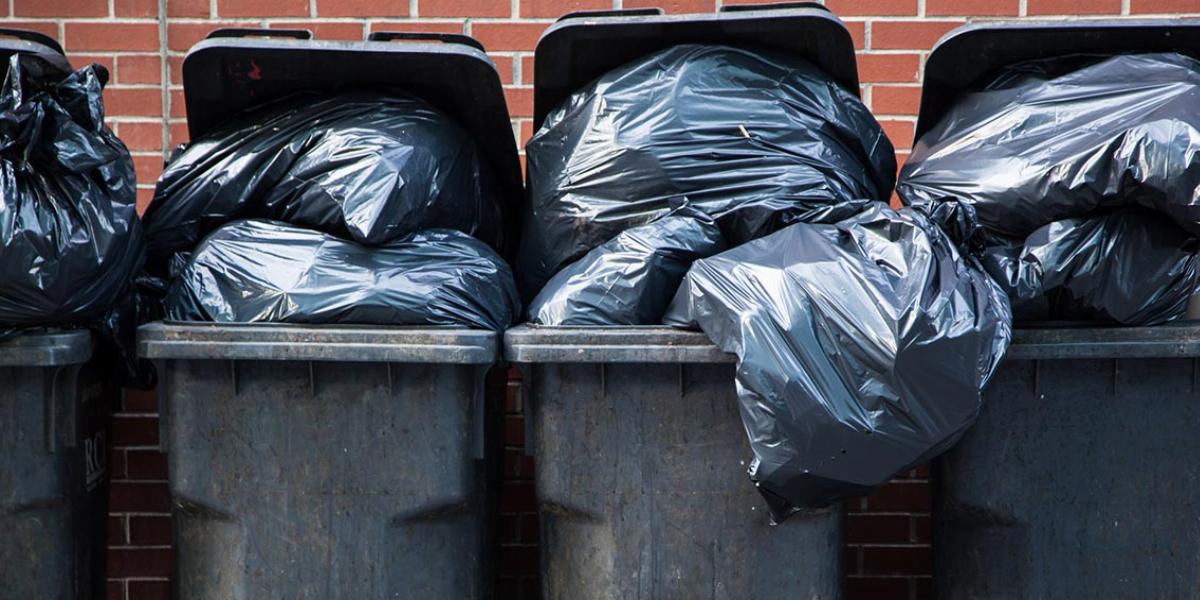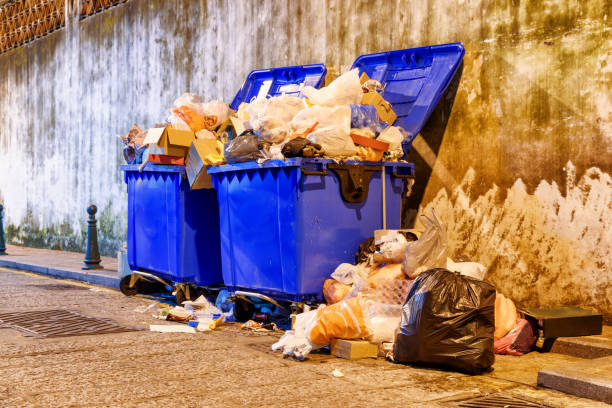
Recent statistics show that the average American produces five pounds of trash daily. The daily waste generated evens out at 15 pounds for a typical household of three people. In a week, that number racks up to around 110 pounds. Suppose that, like most residences, you have a 32-gallon rolling garbage can. Then, your weekly waste will exceed the bin’s maximum weight limit of around 80 pounds — this discrepancy results in overflowing and overstuffed garbage containers.
This begs the question: how should we handle a roadside bin brimming with waste? Should we leave it until the trash collectors arrive to deal with the mess? Or should we find a better place to store them? More importantly, what are the implications of having overflowing garbage bins, and how do we resolve them? This blog will dive into all these questions, so strap in and read on!
Why Is An Overflowing Garbage Bin A Problem?
Trash has long been infamous for being smelly and unsightly. However, the issues posed by overflowing garbage bins go beyond their aesthetic appeal or their impact on our five senses. They can influence the surrounding wildlife, the elements, and even our health. Take a look.
Overflowing Bins Attract Critters And Insects
Mammals and insects alike are drawn to the odor of trash because of the presence of rotten food and other organic wastes. In some cases, especially in bustling cities or urban areas, garbage bins attract stray cats and dogs. When vermin and critters go through your trash, the chances are high that they leave bits and pieces of junk scattered everywhere. They could also carry empty food wrappers or half-eaten lunches. These circumstances harm your neighborhood and municipality. Eventually, one or two critters can quickly turn into a hoard since the excess waste serves as a food source and a shelter. If left unchecked, the number of wild creatures rummaging around the area may cause more significant problems, such as animal bites.
Leftover Trash Can Spread Diseases
When vermin and insects populate a residential area, there is always the threat of carrying and transmitting diseases and infections. Rodents and stray dogs or cats can pass on rabies through bites, and various insects can trigger fatal allergic reactions. Moreover, unkempt garbage bins are fertile breeding grounds for flies. When flies land on people’s food after feeding on waste, it can induce severe gut infections. In other cases, seemingly simple stomach aches can indicate a salmonella infection when you ingest something with animal feces. If your surroundings are filthy and polluted, these untoward conditions are more likely to occur.
Excess Waste Pollutes The Environment
When garbage bins overflow and are not tended to for extended periods, methane production accelerates through the mixture of organic and inorganic wastes in one container. Methane is considered dirty air since it substitutes oxygen and causes nausea, vomiting, memory loss, and other central nervous system complications. Thus, it is a consequential air pollutant and is dangerous at high levels, especially in urban or suburban locations. Poorly managed waste also pollutes surrounding land and waters. If your trash does not fit well in your container, the chances are high that a strong gust of wind may blow debris from your premises. These bits and pieces of trash can land in streams, vegetable gardens, lakes, or others. Not only does water, soil, and air pollution endanger human health; it also threatens the habitat and living conditions of animals and docile wildlife. Simply put: an overflowing garbage bin can disrupt a healthy and peaceful ecosystem.
What Can You Do To Avoid An Overflowing Garbage Bin?
Given the hazards of overflowing garbage bins, responsible homeowners must ensure that their wastes are correctly handled and processed. While it seems that getting a garbage bin with a higher capacity is the most intuitive solution, it is merely a short-term move. Moreover, there are more creative and sustainable ways of managing your trash, so let us dive into the best options.
Rent A Dumpster
Trust us; we have already wrestled with the question in your mind right now: “Isn’t renting a dumpster too extreme a solution for an overflowing garbage bin?” Our verdict? No, it definitely is not! While you may be more familiar with dumpsters you see in large construction site projects, there are smaller dumpsters that fit snugly in residential driveways. The best example is the 10 yard dumpster because it only carries three to four pickup truckloads. Since dumpster rentals can stay on your premises for as long as the lease terms allow, you can keep your waste bin for as long as necessary to fill it with trash.
Compost Your Waste
Suppose you plan to keep your waste container for an extended period to accumulate trash. Then, how could you prevent it from attracting flies and giving off a foul order? The answer is by segregating and composting! Compositing refers to letting organic wastes decompose and turn into fertile soil, such as paper, food scraps, and lawn cuttings. There are several ways to compost, but one of the most popular is trench composting. It is as quick and easy as digging a hole in the ground and tossing your organic wastes into the pit! You could also try the Bokashi method, which is perfect for indoor composting as it will only require an airtight container and Bokashi bran, microorganisms that ferment food waste efficiently. The Bokashi method hails from Japan but is becoming increasingly popular due to its capability to compost even meat and dairy-based food scraps – something traditional composting cannot do. Regardless of which method you go with, mastering the art of composting enables you to keep your inorganic waste pile from smelling or producing methane. At the same time, it sits in your dumpster rental.
Learn How To Recycle
An essential part of segregating is identifying which types of waste could be reused or recycled. Breaking the habit of immediately discarding items we no longer want will help us manage the waste we produce. The more you reuse items, the more you reduce the carbon footprint of producing and acquiring those things. Likewise, if you find belongings that you can no longer reuse, consider whether you can send them to recycling facilities instead of the landfill. Clean paper, metal, wood, and plastic are usually recyclable if they are not made of mixed materials. Fortunately, most dumpster rental companies sort through the waste they haul to retrieve trash that facilities may still recycle. Thus, renting a dumpster is always a step in the right direction if you work only with trusted and reputable service providers.
In A Nutshell
Overflowing garbage bins pose health, environmental, and safety hazards, and they impact not only our households but also our neighbors and the community we live in. To keep our surroundings protected and clean, we can explore various alternatives, such as dumpster rental, composting, and recycling.
If you are looking for a professional dumpster rental service near you, call Cobblestone Container Service! They are a family-owned business, which means they know how vital it is to tackle waste management in the spirit of keeping our families and neighborhoods safe and orderly. Get in touch with them today to learn more about their services and how they can help you!



